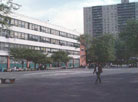Clinical Rotations
First Year Training Facilities and Rotations
Outpatient Clinic
First year fellows spend the majority of their time in the Outpatient Division. There the Intake Clinic conducts supervised intakes. Fellows see children, adolescents and families in different modalities of treatment including individual psychotherapy, pharmacotherapy, group psychotherapy and family therapy. Training in intensive Dialectical Behavior Therapy (DBT) in the Adolescent Depression and Suicide Program (ADSP) provides supervised fellows with an opportunity to treat suicidal and depressed patients.
A crucial component of our outpatient training is the fact that fellows continue to treat their own group of patients for the full two years of their fellowship. This offers them experience in longer-term patient care, while providing an important service to the community we serve. Senior faculty with a broad range of therapeutic experiences and expertise closely supervise these cases.
Consultation/Liaison Service
For three months, first year fellows also work on the Consultation-Liaison (C/L) Service, consulting with the Department of Pediatrics at the Children's Hospital at Montefiore Einstein (CHAM). This rotation provides fellows with a unique opportunity to both assess and do short-term interventions with children and adolescents with a wide range of diagnoses and also collaborate closely with the pediatric and ancillary staff.
During the first year, on-site supervision and teaching ensures that the clinical experiences relate to the clinical teaching. The attending staff on the service supervises consultations and cases are presented at the weekly C/L Rounds.
Psychiatric Observation Suite
First year fellows spend two months with the child/adolescent psychiatric emergency team at Montefiore, where they evaluate and treat children, adolescents and families in crisis. There, the rotation in the Psychiatric Observation Suite provides hands-on exposure to crisis evaluation and intervention with acutely ill psychiatric child/adolescent patients. Fellows will receive on-site supervision by a member of the Child/Adolescent Psychiatry faculty.
This rotation allows first-year fellows to have hands-on experience with patient assessment, treatment, and rapid return to the community and/or referral for further inpatient services. This experience in the emergency department, together with the on-site supervision and learning opportunities working with a varied and challenging patient population, expands the professional growth of the first-year fellow.
Adolescent Depression and Suicide Program/DBT
The Adolescent Depression and Suicide Program (ADSP) provides training and didactics in Dialectical Behavior Therapy (DBT). Here, first year fellows receive intensive academic training in Dialectical Behavior Therapy during their Summer Orientation Program. This weekly full-day program combines clinical and didactic materials taught in a seminar format by nationally renowned faculty. During the first year, fellows may also elect to assess and treat a suicidal or depressed adolescent patient with DBT in a highly supervised training format.
Second Year Training Facilities amd Rotations
 Child and Adolescent Inpatient and Day Treatment Program
Child and Adolescent Inpatient and Day Treatment Program
New York City Children’s Center -Bronx Campus and the Gerard Avenue Day Treatment Program are the sites for our second year fellows to learn about inpatient and day treatment in Child/Adolescent Psychiatry. Fellows rotate on an adolescent service at NYCCC-Bronx, staffed by senior faculty in Child/Adolescent Psychiatry. The inpatient service offers a milieu, in which fellows learn about cutting-edge psychopharmacological treatment, while concentrating on the individual care of hospitalized children. Treating the underserved and complex patient population of the Bronx provides an unparalleled and rich training opportunity. These rotations provide optimal opportunities for training in continuity of care and responsiveness to larger systems of health care.
School Consultation at Bronx School of Science and P.S.8 (Elementary School)
Montefiore and Einstein have a longstanding commitment to consulting with the Bronx Science guidance counselors and teaching personnel to provide short-term psychiatric consultation and treatment for the gifted students at the Bronx School of Science.
Fellows also rotate at an elementary school in the Bronx, PS 8, where a school-health team incorporates mental health treatment into school-based treatment for children. Fellows participate in classroom evaluations, treatment plan meetings and implementation of services on-site at the elementary school.
Developmental Disorders Rotations
The Kennedy Center is the cornerstone of neuroscience and work with the developmental disorders for the Albert Einstein College of Medicine. Trainees rotating here work at an onsite psychopharmacology clinic with senior faculty, observe multidisciplinary evaluations and consult with a wide-range of treatment team members.
Family Court Rotation
Fellows attend Westchester Family Court with a faculty member whose expertise is in forensic child psychiatry. Court cases include child abuse, custody cases, as well other matters that pertain to the court. These observations provide hands-on experience to complement the first and second year curriculum in forensic child psychiatry.
Behavioral Health Integrated Program and Maternal-Infant Mental Health
These programs provide a unique opportunity for the second year fellow to become involved in integrated pediatric programs with either adolescents or mothers and babies. These programs dovetail with the consultation-liaison experience in the first year and add depth to the child development curriculum in the second year. This rotation is an unparalleled experience in settings that preview the systems of care that represent the future of child and adolescent psychiatry.
Fordham College Mental Health Service
Our program represents one of a few fellowships of its kind providing an onsite college mental health experience. Second Year fellows join a team of highly trained college mental health psychologists and psychiatrists for six months to provide short and long-term care of Fordham college students. The vast range of cases includes everything from roommate trouble and homesickness, gender identity and eating disorders to first-break psychoses. Experienced college mental health professionals supervise fellows on-site.



